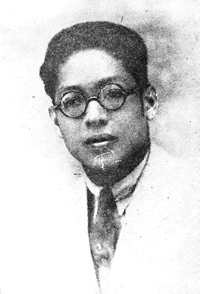4.1.1.10 The poetics and the future of Regino Pedroso (1896 – 1983)

Regino Pedroso was the most decidedly social poet of all those who at some point passed through the avant-garde or avant-garde poetics of the first republican stage, this because he was a worker and felt firsthand the beat of collective oppression, the humiliations and economic precariousness inherent to the life of the proletarian sector of society, the first to bring to poetry the anguish and hope, the reality and the utopia of those who in the underground workshops forged the riches of the nation, diverted to the caste of capital.
At first, Regino Pedroso’s poetic production coexisted with modernism and its motifs of orientalist exoticism, although it is worth clarifying that in his case it was not a deliberate foreign and epigonal investigation with respect to a literary fashion that was about to expire, if not surpassed at least in its exteriorism, but rather Pedroso had Chinese blood and by family tradition came a fascination with the society and culture of the East, which he would reiterate at different moments of his poetic career.
Although many of his texts abound in common topics of the avant-garde, such as the reference to machinery and the industrial over elements of the natural environment, in his case this has another meaning since it constitutes only a means to prefigure the material sphere of the worker, his daily action in the everyday life of a job that is sometimes alienating, other times with love, since the root of the problem was never the work itself, but the way in which its fruits were taken away from him, producing a progressive emotional distancing from his own work.
Eugenio Florit sums up Regino Pedroso’s status as a worker and creator, and his transition from modernism to a poetic condition that participates in his life circumstances, with a high social content:
“Regino Pedroso was following other, less elaborate paths, where silk gives way to iron and the rhythm of exotic camels to that of the workshop. Because the poet is a worker. He works with anvil and hammer. And from that hard work comes the dissatisfied a new accent that places him at the forefront of our so-called “proletarian” poets.”
In his early poetic works, the political and social content sometimes overrides the aesthetic structure of some verses; it doesn’t adequately integrate as an art form, citing the aforementioned content; however, as he evolved in the successive collections of poems he conceived, it is clear that his fidelity to working-class themes and broader social bases is expressed in increasingly refined and effective lyrical forms.
Regino Pedroso’s intrinsic rebelliousness, the Americanist spirit of many of his verses, and even the anti-imperialism he expressed in his compositions in the most direct way, constitute substantial contributions to the poetic content of the nation. From the point of view of style and artistic stature, he has been one of the most important poets of his generation.








